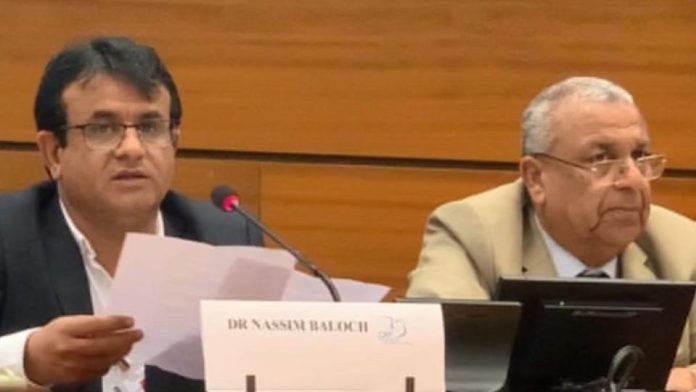BNM Chairman Dr. Naseem Baloch said that Pakistan is trying to prolong its forced occupation of Balochistan. For this, it is trying to change the demography of Balochistan through settlement. It is accelerating looting in order to stabilize itself, maintain its occupation, and destroy the demand for and sense of freedom among the Baloch.
He expressed his views in a program organized by the Baloch National Movement UK chapter on Balochistan’s Pledge Renewal Day. Balochistan Pledge Renewal Day is celebrated every year on August 11 to commemorate the independence of Balochistan from the British occupation. On this day, the Baloch nation remembers its lost freedom and renews its vow to regain it.
Apart from Dr. Naseem, Baloch historian Dr. Naseer was also invited to address the historical background of the day.
Dr. Naseem further said that Pakistan is trying to expand religious extremism by keeping the Baloch nation backward in the field of education and development in order to continue its occupation of Balochistan so that future generations of Baloch will be deprived of education, mental and being deprived of conscious development, they remained victims of mutual differences and could not stand against Pakistani ambitions. The state is also fueling tribal conflicts to confuse the Baloch among themselves.
Dr. Naseem Baloch, while talking about political activities in Balochistan, said that since its existence until today, the state of Pakistan has been afraid of the political consciousness and struggle of the Baloch nation. Baloch political activists and leaders have been killed, and thousands have been forcibly disappeared. The Baloch nation has banned pro-Baloch political parties. However, it has not been able to stop the political journey of the Baloch nation, and the Baloch are moving towards their destination in a more organized manner than before.
He said that despite its atrocities, Pakistan could not eliminate the yearning for freedom from the hearts of Baloch people, and they are facing constant armed and political resistance from the Baloch nation.
Speaking on this occasion, Dr. Naseer Dashti said that before describing the history of August 11, we have to go into the background of why we needed to get freedom on August 11 and under what objectives we were enslaved by Great Britain. After British withdrawal from Dakhila and the subcontinent, Balochistan was handed over to the newly born country of Pakistan under British rule.
He said that in the early decades of the nineteenth century, the world was dominated by a few powers, in which the two world powers were Britain and Russia at the top, while France and Spain were also among the world powers, but their monopoly extended to Latin America and the continent of Africa in the west. While Britain’s occupation was from the continent of Australia to the continent of America, and India was their main colony and market in Asia, on the other hand, Russia was expanding its occupation in Central Asia.
Dr. Naseer Dashti, highlighting the background of the British occupation of Balochistan, said that in the beginning, Britain kept its border in India up to the Indus River, but the Russian expansionist ambitions in the west and its occupation of Central Asia prompted Britain to adopt a forward policy. In order to get within a few hundred kilometers and protect the most profitable colony, India, from a possible Russian attack, they started colonizing Afghanistan and installing a puppet ruler. They started the effort to use Afghanistan as a buffer state. Under this objective, they invaded Afghanistan via Peshawar and Baluchistan, occupied it, and returned with the puppet ruler Shah Shuja replacing Dost Muhammad as ruler. Using a minor incident as an excuse, the British attacked the state of Kalat and killed Khan Kalat along with hundreds of his companions, which started the dark days of slavery in Balochistan.
He said that due to strategic importance, the British separated the areas of Balochistan adjacent to Afghanistan under the name of British Balochistan and kept them directly under their control, while the rest of the state of Kalat was run as a subordinate state by the puppet Khawanin Kalat. After the Treaty of Mustang, the Crown was dependent on Britain to conduct its internal and external affairs.
According to Dr. Naseer Dashti, the future of Balochistan received a second shock when the labor-friendly socialist revolution took place in Russia under the leadership of Lenin and the Bolshevik Party, due to which the workers in other countries, including Great Britain, saw a ray of hope and intensified their efforts. Fearing this socialist revolution, Britain made a secret plan to divide the subcontinent before withdrawing from it. According to this plan, it was decided to create a separate independent country for Muslims, Pakistan, to act as a buffer state between Soviet Russia and the left-leaning state of India and to prevent Soviet expansion.
Dr. Naseer Dashti, highlighting the events of 1947, said that when the British decided to leave India, the Khan of Kalat, who was an incompetent ruler, was convinced by other Baloch leaders that the British were going back, so they talked about the independence of Balochistan. At the insistence of Baloch political figures, Khan of Kalat chose Muhammad Ali Jinnah as his lawyer so that he could fight the case of Balochistan. However, they could not prevent the British from taking possession of the Balochistan territory and later joining Pakistan.
He said that the state of Kalat, after its independence on August 11, barely remained free for nine months before being taken over by the newly born state of Pakistan with the ulterior motives of the British and their help, while the incompetent Khan of Kalat did not control his state at any level. He neither attempted to rescue nor provided assistance to his brother Agha Abdul Karim Khan and his companions who were determined to oppose the forceful annexation of the Kalat state.

